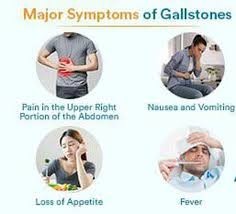Which assessment findings will the nurse anticipate in the client with cholelithiasis?
Coffee ground emesis, nausea/vomiting
Right lower quadrant abdominal pain, constipation.
Absent bowel sounds, abdominal pain
Right upper quadrant abdominal pain, nausea/vomiting
The Correct Answer is D
Cholelithiasis refers to the presence of gallstones in the gallbladder or bile ducts. The most common symptom is right upper quadrant abdominal pain, which may be colicky or steady. Nausea and vomiting are also commonly associated with cholelithiasis.
Coffee ground emesis and constipation are not typical findings associated with cholelithiasis. Absent bowel sounds may be a sign of bowel obstruction but are not specific to cholelithiasis.

Nursing Test Bank
Naxlex Comprehensive Predictor Exams
Related Questions
Correct Answer is C
Explanation
Nitroprusside is a potent vasodilator medication used to rapidly reduce blood pressure in hypertensive emergencies. Its primary action is to dilate blood vessels, leading to a decrease in systemic vascular resistance and subsequent reduction in blood pressure.
Monitoring the client's blood pressure is crucial during the administration of nitroprusside to ensure that the medication is achieving the desired effect and that blood pressure is being appropriately controlled. The nurse will assess blood pressure frequently to adjust the infusion rate and titrate the medication to achieve the desired therapeutic effect while avoiding hypotension or other adverse effects.
Correct Answer is A
Explanation
A 3% saline solution is a hypertonic solution used to increase serum sodium levels in cases of severe hyponatremia. However, it can lead to fluid overload and pulmonary edema. The presence of crackles throughout both lung fields indicates the accumulation of fluid in the lungs, which is a serious adverse outcome.
The patient's radial pulse rate of 105 beats/min is within a normal range and does not directly indicate an adverse effect of the saline infusion.
The presence of sediment and blood in the patient's urine may be unrelated to the 3% saline infusion and could indicate other issues such as urinary tract infection or kidney injury.
An increase in blood pressure from 66/50 to 122/74 mmHg is an expected effect of a hypertonic solution like 3% saline, as it can cause an increase in intravascular volume. While the increase in blood pressure is significant, it does not represent an adverse outcome specific to the infusion itself.
Whether you are a student looking to ace your exams or a practicing nurse seeking to enhance your expertise , our nursing education contents will empower you with the confidence and competence to make a difference in the lives of patients and become a respected leader in the healthcare field.
Visit Naxlex, invest in your future and unlock endless possibilities with our unparalleled nursing education contents today
Report Wrong Answer on the Current Question
Do you disagree with the answer? If yes, what is your expected answer? Explain.
Kindly be descriptive with the issue you are facing.
